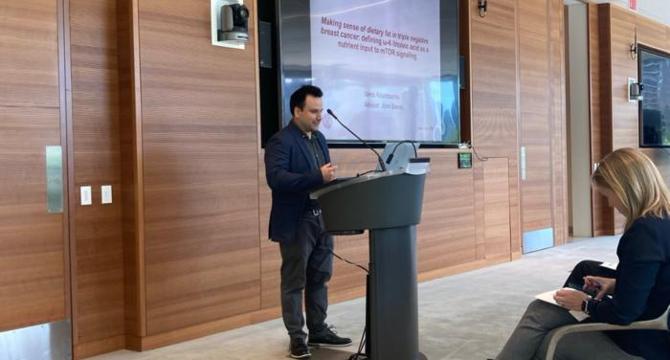Bioengineer
3d
152

Image Credit: Bioengineer
Dr. Nikolaos Koundouros Honored with 2025 Tri-Institutional Breakout Award
- Dr. Nikolaos Koundouros, a postdoctoral associate at Weill Cornell Medicine, has been honored with the 2025 Tri-Institutional Breakout Award for Junior Investigators, recognizing his work in nutrition, metabolism, and cancer biology.
- Dr. Koundouros's research focuses on how dietary nutrients, particularly polyunsaturated fatty acids like omega-6 and omega-3, impact molecular pathways in breast cancer, specifically triple-negative breast cancer (TNBC).
- His findings, published in Science, reveal how linoleic acid, an omega-6 fatty acid, accelerates tumor growth in TNBC through specific molecular mechanisms, shedding light on the role of dietary components in cancer biology.
- By integrating nutritional science with molecular oncology, Dr. Koundouros's work suggests tailored dietary interventions could enhance breast cancer treatment, especially for subtypes lacking effective therapies.
- His research extends beyond oncology to explore the impact of omega-3 fatty acids on metabolic diseases like obesity and diabetes, aiming to uncover new therapeutic pathways for chronic illnesses.
- Dr. Koundouros's approach combines biochemical, molecular, and clinical insights, emphasizing interdisciplinary collaboration to translate laboratory findings into clinical applications.
- The Tri-Institutional Breakout Award supports Dr. Koundouros's future research, intending to decode cellular nutrient sensing mechanisms and develop novel therapeutic strategies for chronic diseases.
- Recognized alongside other awardees at a symposium, Dr. Koundouros's work represents a forward-looking blend of scientific innovation, patient-centered care, and translational research in cancer biology.
- His contributions underscore the potential for dietary interventions and metabolic modulation to improve patient outcomes, redefine cancer management paradigms, and shape future biomedical research.
- Dr. Nikolaos Koundouros's research exemplifies a convergence of technology, molecular biology, and clinical relevance, offering novel insights into cancer progression and potential therapeutic avenues for personalized treatment.
Read Full Article
9 Likes
For uninterrupted reading, download the app